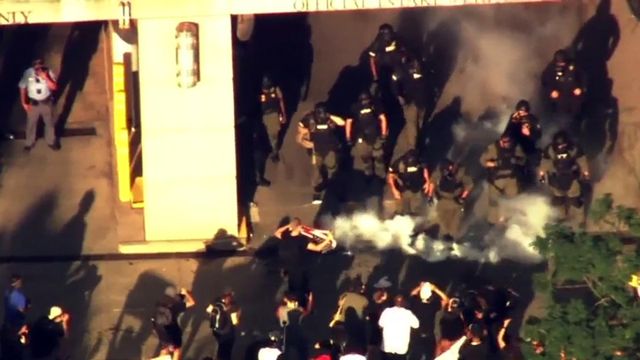Wake sheriff: Use of tear gas 'absolutely necessary' during May riots in downtown Raleigh
Wake County Sheriff Gerald Baker on Monday discussed recent protests, his deputies' use of tear gas and his efforts to combat racial injustice with members of the Wake County Board of Commissioners.
Posted — UpdatedReferencing recent social movements and a widespread call to end racism, Baker said, based on feedback from citizens, Wake County is on "the right track" but has a long way to go.
"It is my opinion that things are a whole lot better than they were," he said,
In the virtual meeting, the commissioners thanked Baker for his transparency. They called for an open and "candid conversation" with no set agenda.
Baker said he wanted to begin with "the elephant in the room" and jumped right into the issue of police brutality within the Black community. He said he has made it known to everyone in the Wake County Sheriff's Office that racism will not be tolerated.
"I have made it very clear that any person who is a member of this office who has issues with people of color or any other culture, if that interferes with their work, then we have no place for you," he said.
Baker said it is his priority to reach the entire community and make sure they know where the Wake County Sheriff's Office stands.
Referencing police brutality, he said, "Not all law enforcement is out to do these types of things. You are not going to have those experiences [in Wake County], but if you do, those officers are going to be dealt with very, very quickly."
"Their training should have prevented them from taking a person's life, no matter what color they are," Baker said. "We need to make sure the head of every police office and agency makes it clear to everyone that they are going to be held accountable for those types of decisions. It is crystal clear inside this office, I can assure you that."
"There were plans to burn down the jail and both courthouses," Baker said, citing intelligence gathered by investigators. "It was our job to keep those things from happening, and we did that. ... If I had to [use tear gas in that instance] again, I would."
Commissioner Jessica Holmes said she did not question Baker's decision to use tear gas at that time but expressed concern that peaceful protesters are often injured by the gas, sometimes when they are trying to stop people damaging property.
"On any given day, I will choose the lives and safety of our people before I support the protection of a window," Holmes said, stressing that she doesn't approve of the property damage but is worried about the people who peacefully use their right to protest.
"There are people in this community who feel safer because you are our sheriff," she said.
Much of the conversation centered on how to reach the entire community with programs and task forces meant to put an end to racism. Commissioners and Baker discussed the use of body cameras, additional de-escalation and crowd management training and programs to work with juveniles to combat crime.
When asked about his outreach efforts, Baker said a public meeting has already been scheduled for July 16.
Holmes urged Baker to include not just commissioners and county government employees but the community as well.
"A task force is usually filled with people with the best credentials, [but not always] people with lived experiences," Holmes said, adding the conversation and movement should "not be contained to a government building."
Baker reiterated his goals as sheriff and saying it's his priority to reach young people, protesters and other groups that may not be a part of the important, ongoing conversation in Wake County.
"I believe that God has placed me here to make sure I serve this county," he said. "I recognize that there is an immediate need for community outreach. We want to serve people in ways that have never been done in this office."
Related Topics
• Credits
Copyright 2024 by Capitol Broadcasting Company. All rights reserved. This material may not be published, broadcast, rewritten or redistributed.






